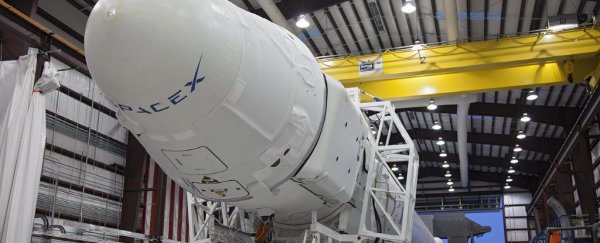Elon Musk just gave us the first look at his rocket company's bold plan to bring ultra-high-speed internet to the entire world.
Musk tweeted out an image of 60 satellites packed into SpaceX's Falcon rocket on Saturday, along with fresh details about the global satellite networking gambit.
SpaceX currently plans to launch the rocket on Wednesday, Musk said, promising more information then.
It's scheduled for between 10:30 pm and 12 am ET on Wednesday night (0230 and 0400 UTC Thursday), aboard a 230-foot-tall (70 meter tall) Falcon 9 rocket.
First 60 @SpaceX Starlink satellites loaded into Falcon fairing. Tight fit. pic.twitter.com/gZq8gHg9uK
— Elon Musk (@elonmusk) May 12, 2019
"Much will likely go wrong on 1st mission," Musk tweeted.
The Starlink satellites, as they're called, are part of Musk's plans to build an unprecedented network of internet-providing spacecraft.
Musk first announced the idea in 2015 and aims to build up a fleet of nearly 12,000 satellites. SpaceX has been ramping up fundraising in preparation for that and another high-profile project.
If the iconoclastic entrepreneur meets his goals, internet users around the world could see download and upload speeds that are around 40 times faster than average, no matter where they live.
Musk and Space X have not said how much they would charge for the service, Business Insider previously reported, but the goal is to keep prices low and best competing and similar networks like OneWeb or Jeff Bezos' Project Kuiper.
This will not be SpaceX's first launch of the satellites. The rocket company previously launched two of the experimental satellites in late February.
But those satellites, named Tintin A and Tintin B, were trial satellites, and the latest are production design-level, Musk said on Saturday.
Musk also shared a game plan for SpaceX moving forward.
To get minor internet coverage, "6 more launches of 60 [satellites are] needed," Musk said, while moderate coverage would require 12. SpaceX has said it aims to have internet coverage available starting in 2020.
 An illustration of SpaceX's constellation of Starlink satellites. (Mark Handley/UCL; YouTube)
An illustration of SpaceX's constellation of Starlink satellites. (Mark Handley/UCL; YouTube)
As one Twitter user noted in response to Musk, six additional launches of 60 satellites comes to 420 satellites total. Musk was famously fined US$20 million by the SEC for claiming that he might take Tesla public at US$420 a share.
"That *might* not be my lucky number," Musk joked.
Though the first Starlink launch will take place on a Falcon rocket, the company has been working for years on an ambitious launch system called Starship.
Musk said he'll announce new details about the two-stage vehicle around June 20, but his previous statements suggest it may stand nearly 400 feet (120 meters) tall, be fully reusable, and lug perhaps 150 tons of cargo into orbit.
If Starship becomes operational in the early 2020s, as Musk hopes it will, the spacecraft may be able to deploy hundreds of Starlink satellites at a time instead of dozens.
What's more, a Starship designed for people may be poised to launch them to the moon and perhaps Mars.
This article was originally published by Business Insider.
More from Business Insider:
